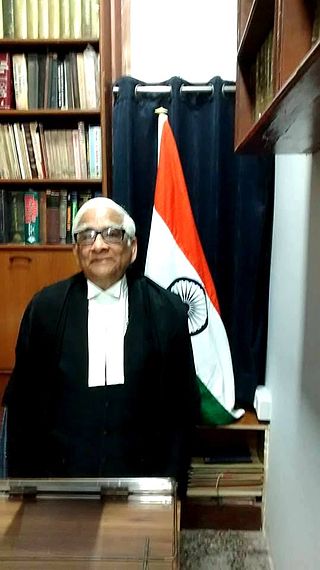Related Research Articles
Muhammad Haleem, LL.D. (HC), HI was a Pakistani jurist who served as the 10th Chief Justice of Pakistan from 1981 to 1989, the longest serving Chief Justice in the history of the judicial branch in Pakistan. He was even endorsed by successive future regimes in Pakistan.
Malhotra is an Indian Punjabi surname of the Dhai Ghar sub-group of Khatris from Punjab. Malhotra is a modified Punjabi language version of Mehrotra. Families with last name Malhotra can be Hindu or Sikh.

The Federal Court of Australia is an Australian superior court which has jurisdiction to deal with most civil disputes governed by federal law, along with some summary and indictable criminal matters. Cases are heard at first instance mostly by single judges. In cases of importance, a full court comprising three judges can be convened upon determination by the Chief Justice. The Court also has appellate jurisdiction, which is mostly exercised by a Full Court comprising three judges, the only avenue of appeal from which lies to the High Court of Australia. In the Australian court hierarchy, the Federal Court occupies a position equivalent to the supreme courts of each of the states and territories. In relation to the other courts in the federal stream, it is superior to the Federal Circuit and Family Court of Australia for all jurisdictions except family law. It was established in 1976 by the Federal Court of Australia Act.

The Faculty of Law, University of Delhi is the law department of the University of Delhi. It has the unique distinction of producing the largest number of sitting judges of the Supreme Court of India, with many notable alumni's from various fields.

The Industrial Disputes Act, 1947 extended to the whole of India and regulated Indian labour law concerning trade unions as well as Individual workman employed in any industry within the territory of Indian mainland. Enacted on 11 March 1947 and It came into force 1 April 1947. It was replaced by the Industrial Relations Code, 2020.
The Court of Arbitration was the first court in New South Wales, a state of Australia which dealt exclusively with industrial relation disputes in the early twentieth century. Justice Lance Wright claims that it perhaps was the first court of its type in the world. The court was unique at that time as it was the first court of its type to deal with labour relations between employer and employees on a compulsory basis. Previous arbitration measures between employer and employee had been on a voluntary basis or had been based on the criminal justice system through the use of criminal penalties. The conventional economic model is that both employer and employee enjoy equal bargaining power to set wages and conditions. This asserts that both parties are able to agree on a fair market price for the cost of labour free from distortions. However, where employers or employees group together, these outcomes can be distorted particularly in “boom” or “bust” economic conditions. The purpose of the court was to change the manner in which employers and employees negotiated pay and conditions. It was an attempt to reduce the power imbalances between employer groups or employee unions that arose from using collective bargaining, and the resulting use of that market power to influence wages, and also to reduce the threat of lockout or strikes to achieve those ends.

Makhdoom Ali Khan, is a Pakistani lawyer who is a Senior Advocate Supreme Court. Khan has held numerous positions, including Attorney General of Pakistan, chairman of the Pakistan Bar Council, member of the Law and Justice Commission of Pakistan, board member of the Federal Judicial Academy of Pakistan and of the Sindh Judicial Academy.

Ajit Prakash Shah is the former Chairman of the 20th Law Commission of India. He was the Chief Justice of Delhi High Court from May 2008 till his retirement in February 2010.
Alternative dispute resolution (ADR), or external dispute resolution (EDR), typically denotes a wide range of dispute resolution processes and techniques that parties can use to settle disputes with the help of a third party. They are used for disagreeing parties who cannot come to an agreement short of litigation. However, ADR is also increasingly being adopted as a tool to help settle disputes within the court system.
Patibandla. Chandrasekhara Rao was an Indian jurist. He was from Veerullapadu Village Guntur-Krishna District region of coastal Andhra Pradesh of what was then called Madras Presidency.
The Employment Court of New Zealand is a specialist court for employment disputes. It mainly deals with issues arising under the Employment Relations Act 2000. The Employment Court is a court of record and has equal standing to the High Court of New Zealand.

Gopal Subramanium is an Indian lawyer, international arbitrator, academic and Senior Advocate who practices primarily in the Supreme Court of India and the Delhi High Court. He served as the Solicitor General of India 2009–2011 and Additional Solicitor General of India 2005–2009. He served as Chairman of the Bar Council of India 2010–2011.

Dalveer Bhandari is an Indian jurist. He is currently one of the judges of the International Court of Justice. He is a former judge of the Supreme Court of India and former chief justice of the Bombay High Court, he was also a judge of the Delhi High Court.

Kuttiyil Mathew Joseph is a former judge of the Supreme Court of India; he retired on 16 June 2023. He is former chief justice of the Uttarakhand High Court. Before his appointment as chief justice of the High Court of Uttarakhand on 31 July 2014, he had served as a judge of the Kerala High Court for more than nine years.

Jumbunna Coal Mine NL v Victorian Coal Miners' Association is a landmark Australian judgment of the High Court. The matter related to the Commonwealth Government's power to make laws for the conciliation and arbitration of interstate industrial disputes under subsection 51(xxxv) of the Australian Constitution and the incidental power under subsection 51(xxxix), but in reaching a decision set principles on matters of statutory interpretation affecting the Constitution.

Indu Malhotra is a retired judge and senior counsel of the Supreme Court of India. She was the second woman to be designated as senior advocate by the Supreme Court. She was the first woman advocate to be elevated as a judge of the Supreme Court of India directly from the bar. She also authored the third edition of The Law and Practice of Arbitration and Conciliation (2014).

Subodh Markandeya is a senior Indian lawyer, author and judicial activist. He primarily practices at the Supreme Court of India, but also appears in various high courts. He has served as the standing counsel for Government of India, Life Insurance Corporation of India (LIC), State of Uttar Pradesh, Uttar Pradesh Financial Corporation (UPFC), Uttar Pradesh State Electricity Board (U.P.S.E.B.), Uttar Pradesh Jal Nigam and numerous developmental authorities. He was appointed 'amicus curiae' by the Supreme Court in the 'Tihar Jail Enquiry' (1982–85).
The Arbitration and Conciliation Act 1996 is an Act that regulates domestic arbitration in India. It was amended in 2015 and 2019.

Australian Boot Trade Employees Federation v Whybrow & Co, commonly known as Whybrow's case or the Boot Trades case, was the third of a series of decisions of the High Court of Australia in 1910 concerning the boot manufacturing industry and the role of the Commonwealth Court of Conciliation and Arbitration in preventing and settling industrial disputes. In doing so the High Court considered the constitutional power of the Federal Parliament to provide for common rule awards and the jurisdiction of the High Court to grant prohibition against the Arbitration Court. The majority held in Whybrow that the Arbitration Court could not make an award that was inconsistent with a State law, but that different minimum wages were not inconsistent as it was possible to obey both laws. In Whybrow the High Court established the doctrine of ambit, with the emphasis on the precise claim made and refused, and the practice with respect to "paper disputes" being treated "prima facie as genuine and real", with the majority holding that the High Court had power to order prohibition to correct jurisdictional error as part of its original jurisdiction. Finally in Whybrow the High Court unanimously held that the Federal Parliament had no constitutional power to provide for common rule awards.

The Commonwealth Industrial Court, known as the Australian Industrial Court from 1973, was a specialist court to deal with industrial matters, principally the enforcement of awards and orders of the Commonwealth Conciliation and Arbitration Commission. Over time it took on more matters and its judges were allocated a wide range of judicial tasks until it was replaced in 1977 by the Federal Court of Australia which had a more general jurisdiction covering matters arising under Australian federal law.
References
- 1 2 3 4 "Obituary Speech at Delhi High Court" (PDF). Delhi High Court. Retrieved 2018-04-29.
- 1 2 "Activist & expert arbitrator, meet Indu Malhotra, 1st woman lawyer to become SC judge". ET Online. Economic Times. 26 April 2018.
- ↑ Malhotra, Om Prakash (March 14, 1973). "The Law of Industrial Disputes". N. M. Tripathi – via Google Books.
- ↑ Malhotra, Om Prakash (March 14, 2006). The Law and Practice of Arbitration and Conciliation: The Arbitration and Conciliation Act, 1996. LexisNexis Butterworths. ISBN 9788180381201 – via Google Books.